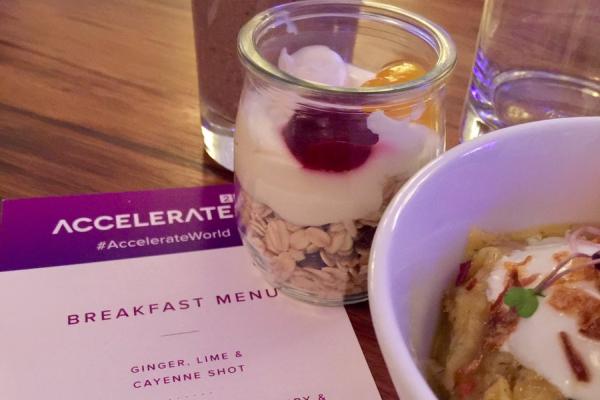Published on the 15/06/2017 | Written by Donovan Jackson

But what did AI-led menu design taste like…
‘May you live in interesting times’, once used by Robert F Kennedy in a 1966 speech, is an Anglicised version of a Chinese curse. We do indeed live in interesting times and things look set to get even more so, as iStart learned over a degustation breakfast prepared by IBM’s ‘Chef Watson’.
Yep, the pinnacle of IBM AI today is analysing various foods and ingredients and coming up with recipe suggestions.
Opening up the event, IBM NZ MD Mike Smith said the challenge which awaits most businesses today is to get actionable insights from data, much of which is now unstructured. That’s where AI plays a role. “AI doesn’t have bias, it scales and it performs,” he noted. “We’ve created Chef Watson by letting it ingest thousands of recipes and food components; we’ve taken that and augmented [celebrity chef] Simon Gault, and everything you’ll eat today is a combination that Watson has come up with.”
Gault, in a prerecorded video, explained that Chef Watson ‘understands the compounds’ and described it as ‘a secret weapon’ (not any more, buddy). “So, for example, you can ask Chef Watson to design a dish from any country and it will tell you what works. It is a match made in heaven.”
But, added Gault, it doesn’t replace the chef.
At the thought-provoking Accelerate events – which are taking place in venues across New Zealand and Australia – the usual worries of our day are being tackled. You’ve heard it all before: massive change, potential joblessness and low productivity, and that old bugbear, inequality (topics which bubbled to the surface repeatedly at CIO Summit taking place around the corner from Accelerate).
These issues are being driven by a wave of technology, accelerated through the power of exponential shifts in computing power and capabilities. Ray Kurzweil and Peter Diamandis – and plenty of other folk – see the end game of this process as being a ‘singularity’, an explosion of ‘superintelligence’ where people and computers or computing ultimately come together. Your children may be cyborgs, one day in our impenetrable future.
Along the way, there will be societal change; many fear it, despite the timeless observation of economist Henry Hazlitt that such fears are ultimately unfounded.
Yet, most of us who have fears for society will personally and professionally take on as much automation and the convenience and efficiency gains it represents. Simply put, we want for ourselves that which we believe society should take on at its peril.
Back to Accelerate. Showing a video of a Japanese-developed robot which evolves with and responds to its environment, elicited interesting responses from attendees: most were fascinated, some creeped out. Aamplify director Sam Williams noted that Wellingtonians appeared to be more creeped and less fascinated than their Auckland counterparts.
The point is that things are changing and fast. Said Williams: “We are going to see more change in the next 20 years than we have in the last 300.” Of course, that statement, had it been made in 1997, would have been as true then as it is today.
But it is the problems of the future which will need to be solved: problems like exploding populations, climate change (though that arguably has more of the characteristics of a religion rather than science), and the limits of resources.
The past does provide some comfort as these problems are faced up to. The work of Norman Borlaug, for example, addressed food production issues and averted the historical ‘Malthusian Catastrophe’ and more recent fears of famine talked up by Paul Ehrlich in his 1968 book ‘The Population Bomb’.
By almost every objective measure, people today live longer, more prosperous and more comfortable lives than ever before. Despite the human tendency towards eschatological thinking, things are getting better, not worse, and there is every reason to believe that as technology accelerates, it will continue to add to human development (as it always has) rather than subtract from it, social media and other follies aside.
As futurist Gerd Leonhard noted in a video presented to Accelerate attendees, the future isn’t something that happens to us, it is something that we create. And that means we have agency to determine whether that will be heaven or hell, utopia or dystopia. Interesting times in a good way, or in the Chinese curse way.
Oh, and what was the Chef Watson breakfast like? We’re not foodies at iStart, and have unsophisticated tastes. Suffice to say, everything tasted just great from a menu which included a ginger, lime and cayenne shot, some sort of superfood smoothie, a muesli concoction and an egg cooked at a precise 62 degrees C. Well done chef. Well done.



























